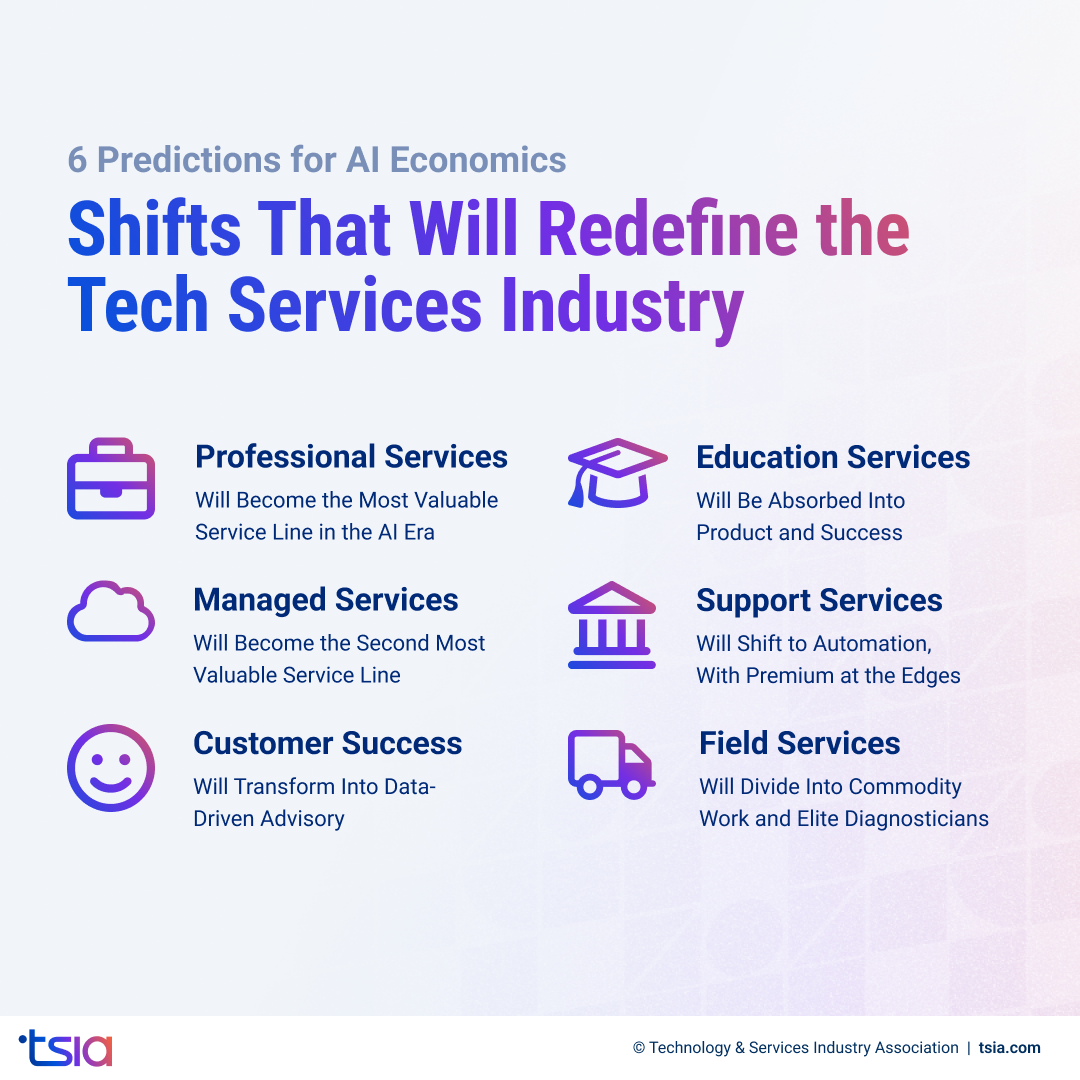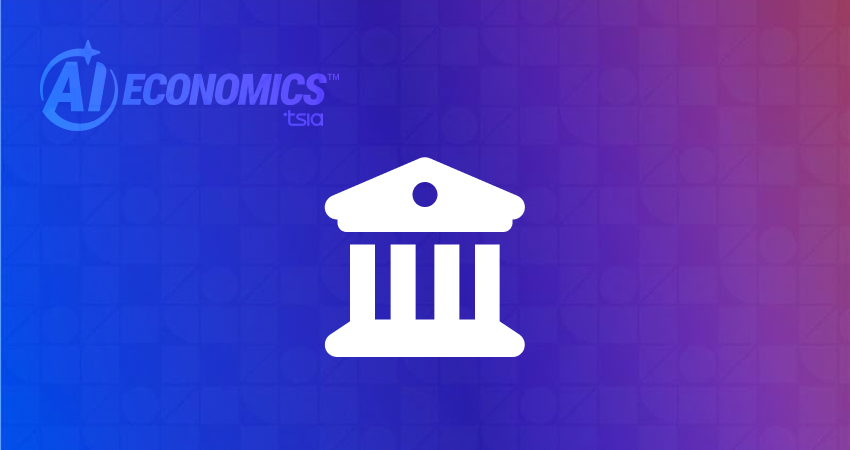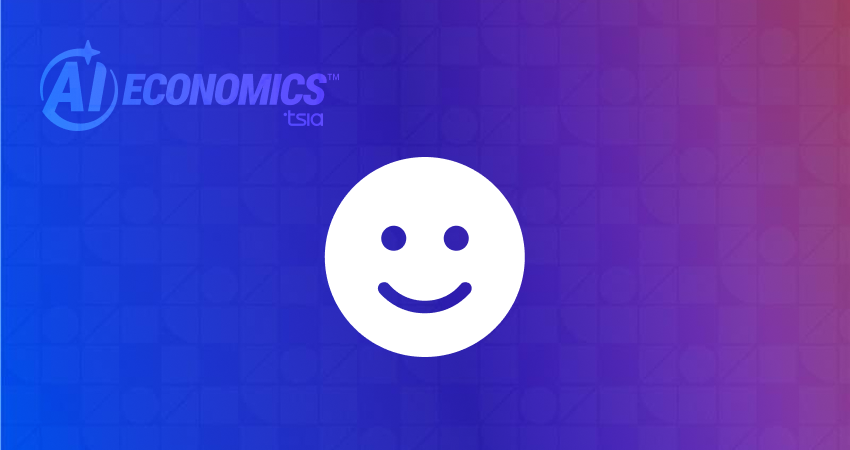AI Economics™ isn’t an incremental change—it’s the most profound disruption the technology industry has faced in half a century. For years, SaaS appeared to be the ultimate destination, the final model for delivery and monetization. That illusion is gone. AI is rewriting the rules of consumption, pricing, and services.
This isn’t evolution, it’s a complete rewiring. The companies that win won’t be the ones clinging to SaaS. Here’s what to watch: six predictions for how AI Economics™ will permanently reshape the services continuum, and why your company needs to pivot now.
Key Takeaways
- AI Economics™ represents a significant shift in pricing and value realization. Consumption, monetization, and delivery are being redefined, while the SaaS model remains prevalent.
- AI won’t eliminate services—it will refactor them. Some motions commoditize (e.g., break/fix), while others (design, advisory, orchestration) become the value engine.
- Winners will be services-rich and outcome-oriented—particularly multi-vendor integrators and strong professional services orgs that package design, integration, and continuous optimization.

1) Professional Services Will Become the Most Valuable Service Line in the AI Era
Professional services (PS) will become the most valuable service line in the AI era. Implementation is commoditizing. Hardware is moving to plug-and-play. AI agents will auto-configure and integrate systems. Charging premium rates for basic deployment is unsustainable.
What rises: strategy, design, and continuous optimization. Consultation and solution design, often under-monetized today, will become premium services. Customers will pay for experts who map AI use cases to business objectives and continually tune performance.
Certinia is already monetizing "AI solution consulting" as a brand-new category. If your professional services org still measures success by utilization hours, you’ll undercapture value.
What to do: Reskill PS teams around business consultation, AI integration, and solution design. Package new offers that monetize expertise in AI-driven transformation, not deployment.
Related: How Certinia is Empowering Professional Services with AI-Driven Innovation
2) Managed Services Will Become the Second Most Valuable Service Line
Managed services will become the second most valuable service line in the continuum. Why? The tech stack is becoming too complex for IT organizations to manage in-house: AI-optimized infrastructure, applications, integrations, and AI models require constant monitoring and tuning.
However, managed services, as we know them, with armies of L1/L2 engineers staring at dashboards, are evolving. AI agents will detect anomalies, swarm to resolve, reroute traffic, reconfigure infrastructure, and self-correct. Lower-level roles diminish.
In their place are AI-powered and AI-native managed service providers. MSPs won't offer monitoring and traditional management. They'll sell autonomous, cognitive orchestration and operations. Adoption is already well underway. Incumbent MSPs face risk if they don’t pivot.
What to do: Reimagine managed service offers around AI-native orchestration anchored on value and aligned with customers’ business outcomes. Build frameworks for AI-enabled monitoring, model optimization, and consumption management. Hire fewer "basic engineers" and more AI strategists and service designers.
Related: AI and Automation in Managed Services
3) Customer Success Will Transform Into Data-Driven Advisory
Customer success is about to be rewritten. Today, most customer success managers (CSMs) primarily act as task managers, handling check-ins, renewals, and logging activities. That profile won’t survive AI Economics.
AI will automate those tasks. CSMs must become data-driven advisors. A great example is how ServiceNow Impact shows how real-time insights can drive prescriptive recommendations based on consumption, adoption, and operations insights. The CSM of the future won’t ask, "How are things going?" They’ll say, "The data shows this pattern. Here’s what to do next."
Investment in AI within customer success is accelerating across our member base. The CSM must be analytics-literate, AI-fluent, and business-savvy. Digital CSMs will handle basic activities and smaller accounts, while strategic CSMs become true advisors.
What to do: Audit customer success talent for data and analytics fluency. Retrain high-end CSMs as strategic consultants. Move mid and low-tier accounts to digital engagement augmented by AI.
4) Education Services Will Be Absorbed Into Product and Success
Don’t write off education services as a P&L. AI has already slashed course development costs by over 60%—a trend illustrated by OpenText and others that’s led to a substantial increase in offer profitability. AI does represent a fundamental shift in where (and how) education is created.
AI will also enable and supercharge in-product education. Software will finally teach you how to use it and how to get value from it. Clicking an icon for guidance won’t be an add-on—it’ll be the default.
Expect many traditional education motions to be consolidated across product and customer success, while a focused education function persists for higher-value offerings (e.g., custom design, advanced enablement, personalized education). If your education team is only optimizing traditional content delivery, you’re optimizing a shrinking slice of the pie.
What to do: Consider merging education motions with product and success (without implying org elimination). Integrate AI-driven learning directly into your product. Redirect investments into product-embedded learning design and advanced/custom education offers.
Related: The AI Blueprint for Education Services: From Data to ROI
5) Support Services Will Shift to Automation, With Premium at the Edges
Support is undergoing rapid automation. AI is taking over foundational support delivery. Products will self-diagnose, self-heal, and self-remediate. Public examples of significant support reductions are setting expectations in boardrooms.
A significant portion of the L1/L2 help-desk/service desk volume will be shifted to AI agents handling basic incident management. Customers won’t pay for what should be table stakes. In a subscription economy, uptime is assumed to be a given. If your products don't work, or even if the customer perceives the issue to be product-related, they churn.
Approximately 69% of TSIA member companies report that support operates as a cost center rather than a profit-and-loss (P&L) center. We expect that to increase as break/fix commoditizes and value shifts to proactive, predictive, and preventative motions.
What to do: Invest in MLOps and AIOps technologies to integrate them into your current delivery platforms, accelerating automation in delivery operations. Repurpose human expertise toward proactive service design, premium success plans, and managed services plays that optimize the customer’s environment—not merely your product.
6) Field Services Will Divide Into Commodity Work and Elite Diagnosticians
Field services will bifurcate.
- Low end: "rack, stack, forget"—increasingly handled by low-skilled workers and eventually, automation and robotics.
- High-end: localized diagnosticians equipped with smart glasses, AI-driven diagnostics, and advanced tools.
Blindly replacing boxes Is a commodity. Future field engineers will be human-machine collaborators—specialists who solve complex onsite challenges.
What to do: Invest in diagnostic enablement and pair AI tools with field engineers. Elevate hiring standards toward advanced diagnostic skills and augmented workflows.
AI Economics™ Is the End of SaaS Complacency
The message is blunt: AI Economics™ increases the need for services—but, they won’t look the same.
Education refactors across product and success. Professional services become strategy-first. Support automates at the core and gets premium at the edges. Managed services ascend to autonomous orchestration and operation. Field services are divided into commodity and elite categories. Customer success becomes data-driven advisory.
Headcounts will shift. Roles will vanish. New categories will emerge. Winners will be services-rich organizations—especially those with strong, multi-vendor professional services and integration chops.
FAQs
What is AI Economics™, and why does it matter for tech companies?
AI Economics™ is a disruptive reordering of how technology is delivered, consumed, and monetized. SaaS remains, but pricing levers move toward consumption, value, and outcomes. Companies that retool their services and pricing around measurable results will outpace those that optimize legacy per-user models.
How is AI changing tech business models?
SaaS remains essential, but products are shifting to adaptive, AI-driven solutions with consumption and outcome-based pricing. Services and products become inseparable in delivering value.
Who’s likely to win in this transition?
Service-rich providers, particularly multi-vendor service integrators and operators with robust, professional services organizations, are well-positioned to succeed. As implementation commoditizes, value shifts to design, integration, and ongoing optimization. Outcome-oriented consulting becomes a core driver of growth.
Smart Tip: Embrace Data-Driven Decision Making
Making smart, informed decisions is more crucial than ever. Leveraging TSIA’s in-depth insights and data-driven frameworks can help you navigate industry shifts confidently. Remember, in a world driven by artificial intelligence and digital transformation, the key to sustained success lies in making strategic decisions informed by reliable data, ensuring your role as a leader in your industry.

.png)




.png)






.png)
